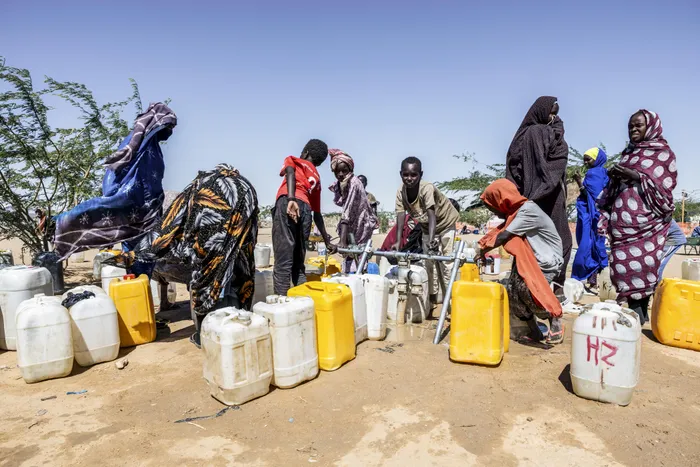African-led reconstruction agenda must categorise response to crisis in Sudan

Sudanese refugees queue to fill jerrycans with water at Oure Cassoni camp in Chad. With the last army stronghold in Sudan's western Darfur region having fallen to paramilitary forces on October 26, the United Nations expects a mass influx of refugees.
Image: AFP
WE, the custodians of the liberation legacy Foundations of Africa, issuing this communiqué in the spirit and tradition of the First and Fifth Pan-African Congresses of the 1963 founding of the Organisation of African Unity, and of the Arusha Declaration, the Accra Charter, and the Lusaka Manifesto, speak with one voice concerning the grave crisis in the Republic of Sudan.
The tragedy unfolding in Sudan is not an isolated national misfortune. It is an echo of unresolved struggles across the continent: the struggle to defend sovereignty against internal militarisation, external manipulation, and the erosion of collective memory.
Sudan’s suffering forms part of the unfinished work of decolonisation. As long as one African people is subjected to the violence of state collapse and the fragmentation of society, the freedom of the continent remains incomplete, as affirmed at the 1961 Conference of Independent African States.
Sudan’s history is one of profound civilisational depth. From the kingdoms of Kush and Nubia to the intellectual centers of Dongola and Sennar, to the anti-colonial movements that resisted imperial imposition. Sudan has stood as a testament to the endurance of African identity and self-determination. Today, that legacy is threatened. The cycle of conflict across Khartoum, Darfur, Kordofan, the Blue Nile, and the eastern regions reflects not only political contestation, but the systematic weakening of national cohesion, civic authority, and the social contract.
We affirm, consistent with the African Charter on Human and Peoples’ Rights, that legitimacy in government derives from the protection of human life and the collective dignity of citizens. Institutions that rule through fear and violence betray their foundational mandate. Power sustained through the destruction of society is not authority. It is the collapse of the state.
We recognise that this crisis is deepened by structural forces that have been visible since the Berlin Conference of 1884–85: the fragmentation of identity, the artificial borders imposed on Sudan’s peoples, the strategic exploitation of mineral and agricultural resources, and the ongoing penetration of foreign interests competing for influence, territory, and extraction.
Sudan today is a meeting ground for geopolitical ambitions and proxy struggles. These dynamics mirror those that Kwame Nkrumah warned of in “Neocolonialism: The Last Stage of Imperialism”.
We therefore assert:
(i) Peace in Sudan must be guided by an African political agency anchored in the Pan African principle that the continent must resolve its own conflicts through collective will and coordinated diplomacy.
(ii) The process of mediation must be inclusive of Sudanese civic groups, women’s movements, youth voices, and traditional authorities. A settlement negotiated solely among armed elites will replicate the conditions of conflict.
(iii) Any sustainable political order must be rooted in justice, including mechanisms for truth-telling, redress, and accountability for grave violations of human rights.
(iv) Humanitarian access must be guaranteed immediately, in alignment with the Kampala Convention on internally displaced persons, recognising the scale of internal displacement now extends beyond national borders and threatens regional stability.
The African future will be determined by whether we confront the disintegration of states with unity or with silence. We further call upon the African Union, the Intergovernmental Authority on Development (IGAD), and regional economic communities to renew and coordinate their engagement in Sudan with a unified diplomatic front.
Africa must speak with one voice — not through fragmented initiatives, but through a coherent continental strategy that places Sudan’s sovereignty and the protection of civilians at its heart.
We urge the United Nations, the League of Arab States, and all international partners to align their actions with African-led efforts, ensuring that humanitarian aid is neutral, inclusive, and free from geopolitical interference. The world must not look away from Sudan’s suffering, nor instrumentalise its pain.
The liberation struggles that birthed our nations imposed upon us a permanent moral responsibility: to defend the humanity of all Africans. The silence of leaders, intellectuals, and institutions in the face of Sudan’s tragedy would be a betrayal of the ideals for which our forebears fought and died.
Beyond the cessation of hostilities, Sudan’s rebirth must be supported through an African-led reconstruction agenda — rebuilding institutions, healing communities, and restoring the confidence of a generation scarred by war.
We propose that a Continental Forum on Post-Conflict Renewal in Sudan be convened under the auspices of the African Union and in partnership with the foundations that authored this article.
We stand with the people of Sudan. We commit to advancing humanitarian relief, principled mediation, civic renewal, and reconstruction rooted in justice, sovereignty, and dignity.
The struggle continues, not as nostalgia, but as a living duty.
We pledge to work together — across our foundations, across our borders — to ensure that the suffering of Sudan becomes the turning point for a new era of African solidarity and moral leadership. The destiny of Sudan is inseparable from the destiny of Africa.
The struggle continues. We remain steadfast.